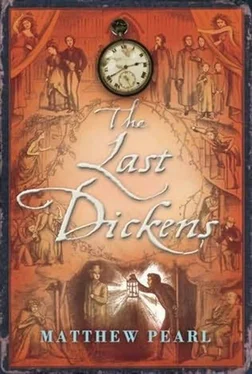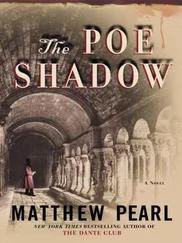Osgood looked at him with confusion. “What do you mean?”
“After we have destroyed this, I plan to find Dickens's ending myself, of course! At least, how I would like it-with Edwin Drood's body discovered to be quite dead and gone in a crypt in Rochester. Would it surprise you to learn I am acquainted with the greatest forgers and counterfeiters, Mr. Osgood? From samples of Dickens's handwriting I will have my men create six installments of the finest literary forgery ever attempted, a class beyond the amateur production of Mr. Grunwald. I am certain John Forster will be only too happy to have this, as it agrees with his own professions about the book's finale. There is only one problem. We must be rid of Dickens's real ending before I can forge my own. That is how you are about to help me.”
“Lower your pistol from her first, Wakefield,” said Osgood. “Then I will do as you ask.”
“You are not in command here!” Wakefield roared, shaking Rebecca's arm violently.
But Osgood waited until the pistol strayed slightly away from her neck. Osgood nodded to his adversary for the gesture, then let the bag drop but kept hold of the top of the strap so that it dangled precariously over the flaming pit of the elevator shaft.
“For me, this would have been my finest publication, Wakefield,” Osgood said meditatively, in the voice of a eulogy. “Only conceive of what a treasure it would have made! Not only to have rescued my firm from our rivals but to have done proper justice to Mr. Dickens's very last work and restore it to the reading public. But for you, the ending of Drood is even more. It's your life. Isn't it? These last six installments could destroy you, since all eyes around would have been on their every word.”
“And that's why you'll drop it!” Wakefield yelled, losing the remnants of his composure. “Let it go!”
Two more big explosions burst the air from below… the final moans from a roasting Herman… the flames exhaling up and licking at the ironworks of the shaft, turning it into a gigantic open chimney and reminding Osgood that all his choices were gone.
“ Drood? ” Molasses, said, gasping at the realization. “That's Drood in there?”
“Quiet!” Wakefield yelled. “Come, Osgood.”
Osgood nodded obediently to Wakefield. “I will let go, Wakefield. I promised, and I do as I promise.”
“I know it, Osgood.”
“But you must hope,” Osgood continued, “that whole way between the Medical College and here I didn't stop for a moment to switch it for some worthless papers, or stuff this with leaves or blank stationery. Are you confident enough that I would destroy what I've searched for all this time, even for the sake of a woman? Are you absolutely certain?”
“I am, Osgood. You love her.”
“Yes,” Osgood said, unhesitating. Rebecca for a moment lost all her terror. “But tell me, Mr. Wakefield,” Osgood continued, “would you find it anywhere inside of you to ever do that, to destroy every-thing you've wanted to protect someone you love?”
Wakefield's eyes widened, his brow poured sweat. Slowly, he stepped toward Osgood. Now he trained his gun on the publisher as he inched toward the satchel.
“Don't think of moving a muscle, Osgood,” said Wakefield, steadying the gun at Osgood's forehead. The publisher nodded his head in surrender. Osgood's gaze shifted to Rebecca, and in that moment he looked in her eyes she knew what to do.
Here Wakefield slipped his hand into the satchel and out came the thick bundle of papers covered in iron gall ink, with yellow shards of the plaster statue clinging to it. He held the gun steady in one hand while with the other he brought the pages to his face. After a moment of quiet suspense, a dark shadow passed over his expression. Awkwardly using two fingers of his gun-holding hand, he flipped the page back to see the next one, then the next one, then finally skipped ahead to the last one.
His face concentrated, contorted with a baffled entrancement. As everything but the manuscript seemed to drift from Wakefield's sight, Rebecca raced forward. She pushed Wakefield from behind with all her strength. Man and manuscript entangled. His instincts empowering him, Wakefield's hand gripped the the ironworks and he raised his pistol at Osgood's head with his other hand-but the fire below had sent the heat through the iron, and now steam rose from under Wakefield's ungloved hand. His hand yielding, Wakefield went plunging down the elevator shaft, all the way down in a screaming drop into the inferno. As he fell, the pages fluttered through the air around him. They fed the flame like fresh wood in a winter hearth. Wakefield crashed and shrieked inhumanly.
In his last moments, his eye seemed to fall on one of Dickens's final pages just as it curled into ashes. And all was devoured as one.
Osgood, ashen pale, hugging his rib cage with his arms, dropped limply to his knees in exhaustion, terror, and relief. He watched the pages below them in various states of demise and ashes. To breathe was utter agony.
“Mr. Osgood!” Rebecca called out. She pulled him out of the way just as Molasses lunged forward onto the edge of the elevator shaft. The Bookaneer was reaching for any stray pages.
“ The Mystery of Edwin Drood!” the Bookaneer called out. “Even one page would be priceless!” His hat tumbled off and caught fire as another explosion from the engine room shot up toward them.
Osgood pushed himself to his feet and leaned into the red hot shaft, grabbing the back of the bookaneer's collar and coat, the bottom of which was already singeing.
“One page!” the man was repeating. “Just one!”
“Molasses! It's gone! It's already gone!”
Osgood pulled Molasses backward as the engine room exploded once more and this time filled the buckling elevator shaft with a solid column of fire. Osgood had taken Rebecca into his arms as they watched from the precipice of the fifth floor.
“Quickly!” urged a newly sensible Molasses as the fire and steam spread.
As the three survivors ran down the stairs, Molasses periodically cried out in lament for the lost pages. “You couldn't, could you? How could you allow him to destroy the end of The Mystery of Edwin Drood! The last Dickens, in a column of smoke!”
The poor Bookaneer, unwilling to accept the defeat, followed behind the firemen as they trooped into the building pulling their hoses from their nearby engines. In the meantime, Rebecca helped Osgood to a curb across from the building. He sat and coughed violently.
“I shall go for a doctor,” said Rebecca.
Osgood held up a hand to plead for her to wait. “I hope the lady shall not be offended,” he said at the first moment he could find his voice. He scraped the ash and grime off his hand, then inserted his hand under his torn shirt, into the bandages around his chest.
He took out a thin collection of papers flattened against his skin.
Rebecca gasped. “Is it…?”
“The final chapter-while I was in the elevator alone, I hid it. Just in case…”
“Mr. Osgood! Remarkable! Why, even without the rest of it, just to have the ending will change everything. What is Edwin Drood's fate?” She reached out her hand, then hesitated. “May I?”
“You have earned it as much as I, Miss Sand,” he said, passing the pages to her.
As she looked down, she passed her hand over the first page of the chapter as if its words could be touched. Her bright eyes glistened with curiosity and amazement.
“Well?” asked Osgood knowingly. “What do you think of it, my darling? Can you read it?”
“Not a word!” she said, then laughed. “Oh, it's beautiful!”

CHARLES DICKENS HAD KNOWN HE HAD TO BE BETTER THAN ALL the others. He was not yet twenty years old and was trying to compete with the more experienced corps of London reporters. It had been their mission to provide verbatim reports of the speeches of the most important members of Parliament and the chief cases at chancery.
Читать дальше













